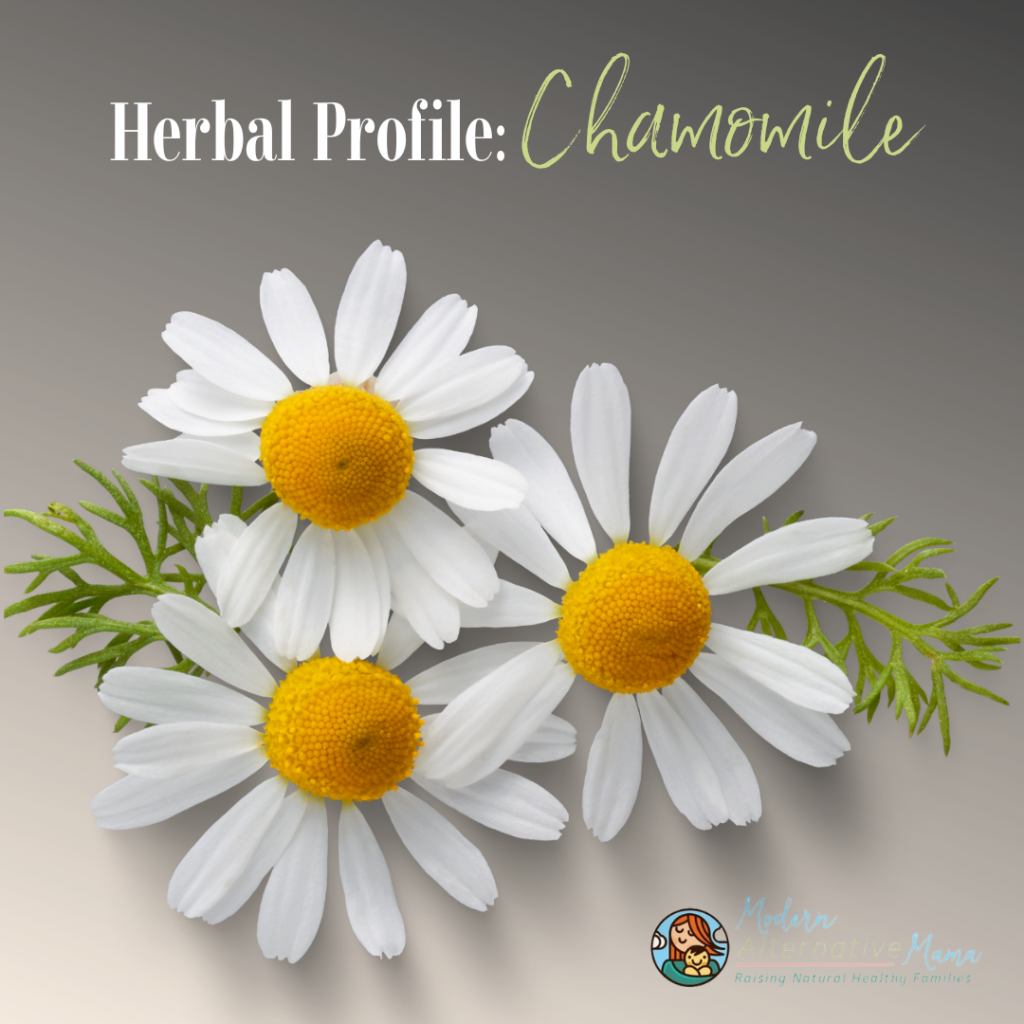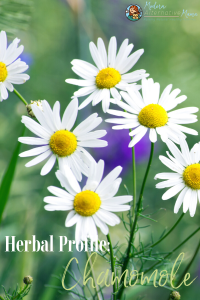What is Chamomile
Chamomile is sometimes referred to as chamomile flower, camomile, chamomilla, or its botanical name Matricaria recutita. Chamomile is a member of the daisy family and has a daisy-like, disc-shaped flower head that consists of lots of tiny flowers in the form of disc florets that create their yellow center with white petals and small, feathery leaves (1).
Health Benefits of Chamomile
Most studies regarding chamomile have studied chamomile tea as it’s a popular beverage that also offers a variety of health benefits such as:
May Promote Sleep & Relaxation
It’s said that 70 million adults in the United States experience sleep disorder symptoms; more than half of them experience insomnia, with another 10 to 15 percent being chronic (2). Thankfully chamomile contains an antioxidant known as apigenin, which is also found in parsley and oregano (3). Apigenin binds to specific brain receptors and may promote sleepiness and reduce insomnia (4,5).
In animal studies, chamomile extract helped sleep-disturbed rodents fall asleep (6). Human studies found cardiovascular patients had fallen asleep shortly after consuming chamomile tea (7). Another study involving postpartum women who drank chamomile tea for two weeks reported better sleep quality and fewer symptoms of depression (often linked with sleeping problems) compared to the group that did not (8). Additionally, people who consumed 270 mg of chamomile extract twice daily for 28 days had fewer nighttime awakenings and fell asleep 15 minutes faster than those who did not (9).
Anti-Inflammatory Properties
Chamomile flowers contain volatile oils like alpha-bisabolol, alpha-bisabolol oxides A & B, and matricin, which usually convert to chamazulene and other flavonoids possessing anti-inflammatory properties (10). Chronic inflammation has been linked with many diseases, such as type 2 diabetes, asthma, and certain cancers (11). One study found chamomile to play a critical role in regulating inflammatory responses and supports the utilization of chamomile as a potentially effective therapeutic anti-inflammatory agent (12).
May Promote Digestive Health
Approximately 60 to 70 million people in the United States are affected by digestive diseases (13). Thankfully, chamomile may promote better digestion by reducing the risk of certain gastrointestinal conditions. One study found chamomile to help prevent stomach ulcers in mice, as it may reduce acidity in the stomach and inhibit the growth of bacteria that contribute to ulcer development (14). Other animal studies found chamomile extract’s anti-inflammatory properties have the potential to protect against diarrhea (15,16).
May Promote Heart Health
Unfortunately, heart disease is the world’s number 1 cause of death (17). Due to the incredibly complex determinants of heart disease and various possible contributions, it’s hard to pinpoint an exact way to prevent it. Still, you can at least take steps to lower your overall risk. That’s where chamomile comes in.
Chamomile tea is rich in antioxidants like flavones, which regulate proteins, transcription factors, and signaling cascades that are otherwise inhibited by elevated oxidative stress (18). Studies have examined the ability of flavones to lower blood pressure and cholesterol levels, which are important markers of your heart disease risk.
Flavones have been studied for their potential to lower blood pressure and cholesterol levels (19), which are important markers of your heart disease risk (20). One study found that diabetic patients who drank chamomile tea with meals had noteworthy improvements in their total cholesterol, triglyceride, and “bad” LDL cholesterol levels compared to those who drank water (21).
May Help Control Diabetes & Blood Sugar Levels
As of 2020, 34.2 million (1 in 10) Americans have diabetes, and another 88 million (1 in 3) Americans have prediabetes (22). On the bright side, chamomile’s anti-inflammatory properties may prevent damage to the cells of your pancreas, which occurs when your blood sugar levels are chronically elevated (4).
Animal studies suggest that chamomile tea may considerably lower fasting blood sugar levels while preventing blood sugar spikes after eating (23,24,25). Additionally, in the diabetic study mentioned above, they found that consuming chamomile tea daily with meals for eight weeks not only improved total cholesterol, triglyceride, and “bad” LDL cholesterol levels but also significantly lowered average blood sugar levels (21).
May Relieve Menstrual Pain
Around 80% of women experience menstrual cramps or pain at some stage in their lifetime (26); thankfully, chamomile may help. One study found that consuming chamomile tea for a month could reduce the pain of menstrual cramps (27). Another study found chamomile was more effective than Mefenamic Acid (MA) in reducing menstrual cramps and regulating emotions (28). Other research concluded that chamomile could effectively treat primary dysmenorrhea and reduce menstrual bleeding (29).
May Slow or Prevent Osteoporosis
Osteoporosis is a bone disease that occurs when the body loses too much bone, makes too little bone, or both, and as a result, bones become weak and may break from a fall or, in more severe cases, from sneezing or minor bumps (30). Approximately 10 million Americans have osteoporosis, and another 44 million have low bone density, placing them at increased risk (31). One study demonstrated chamomile tea helped promote bone density and considered chamomile a “functional food” to prevent osteoporosis (32).
Anticancer Properties
Chamomile is rich in antioxidants like flavones, which can neutralize free radical damage and aid cancer prevention (33). Additionally, chamomile contains the antioxidant apigenin, which in test-tube studies, demonstrated the ability to fight cancer cells, especially those of the breast, digestive tract, skin, prostate, and uterus (34,35,36). Another study observed that those who drank chamomile tea 2-6 times per week were significantly less likely to develop thyroid cancer than those who did not (37).
Safety Concerns
Mainstream sources state that given the lack of evidence about chamomile’s long-term safety, chamomile is not recommended for pregnant or breastfeeding women. They also recommend talking to a pediatrician before giving chamomile to infants and children (38). Contrarily, trusted herbalist Richard Whelan discusses how widely Chamomile is consumed worldwide, yet there are exceptionally few reports of adverse reactions.
Richard Whelan states chamomile is exceptionally safe for the great majority of people. However, since chamomile is a part of the ragweed family, some people may find that they have an allergy to Chamomile. When someone with this allergy has skin contact with the herb, it may cause itching or a rash, and drinking the tea may cause some moderate swelling or discomfort.
Richard Whelan also states chamomile tincture will almost certainly not cause an allergic reaction even in someone who cannot drink the tea as it appears to be the pollen in the plant that is the problem, and these do not remain present in the tincture (39).
As for chamomile essential oil, aside from the precaution to never use essential oils internally or undiluted, trusted aromatherapist Wendy Robbins doesn’t indicate any special precautions when using Roman Chamomile Essential Oil (40) and caution that a drug interaction may occur if using drugs metabolized by CYP2D6 with German Chamomile Essential Oil (41). Roman and German Chamomile Essential Oils may cause dermatitis in some, so I recommend a topical dilution of 1-3% for ultimate essential oil safety. Finally, both Roman and German Essential oils are safe for children and while pregnant and breastfeeding.
How to Use Chamomile
You can find chamomile in dried bulk, capsules, powders, extracts, oils, or tinctures. Tinctures always contain the most concentrated amount of herbs. Teas and soups are also options, especially when following ayurvedic medicine recipes. If you’re a DIY person, some great starter recipes are:
Follow the recommendations of any supplement; some of my recommendations include:
- Earthley’s All-Purpose Salve is the perfect remedy for minor scrapes, cuts, rashes, burns, and more. Safe for all ages, this multi-purpose salve stick is a must-have for any natural-minded family.
- Earthley’s Anxiety Relief is formulated with herbs chosen for their ability to calm the body, improve mood, and relieve anxiety without unfortunate side effects.
- Earthley’s Baby Balm is a natural diaper cream that is a pure, clean salve to protect your little one’s skin and help it heal. Safe for cloth diapers, this salve is made to help those diaper rashes and minor burns, cuts, and scrapes.
- Earthley’s Moisturize Me (Dry Formula) is an all-natural and botanical moisturizer explicitly designed for the face. Formulated with non-comedogenic and essential oils, this product hydrates and replenishes the skin. Moisturize Me is food for the face that will nourish skin to relieve concerns like acne and dry, flaky skin.
- Earthley’s Ouchie Stop Essential Oil Blend soothes cuts, scrapes, bumps, and bruises. This simple blend combines Roman chamomile, copaiba, and vetiver to promote healing and relieve minor pain.
Disclaimer: This post is not intended as medical advice. These statements have not been evaluated by the FDA, and nothing in this post is intended to diagnose, treat, or cure anything. If you have questions, please do your own research or seek advice from a health professional.







